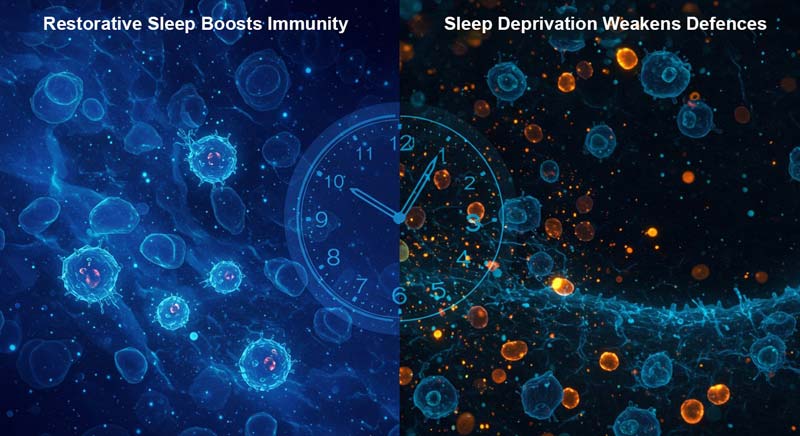Regular sleep patterns prevent a torrent of physiological disruptions leading to serious diseases. Sleep impacts numerous vital processes that maintain our physical and mental well-being, from cellular repair to hormone regulation.
Sleep orchestrates vital processes safeguarding cellular health, from clearing toxic proteins in the brain to regulating immune function. During rest periods, the brain’s waste removal system operates at peak efficiency, increasing metabolic waste elimination by up to 60%. This cleaning process proves essential for maintaining cognitive function and preventing cellular damage.
The implications of disrupted sleep reach deeply into our physiology. Just six nights of reduced sleep can trigger pre-diabetic states in healthy adults. In contrast, a night of poor sleep can reduce cancer-fighting natural killer cells (specialised immune cells that target cancer cells) by up to 70%. These dramatic shifts highlight how regular sleep patterns prevent the breakdown of essential protective mechanisms.
Research reveals sleep’s profound influence on disease prevention through multiple pathways. The glymphatic system (the brain’s waste clearance system) becomes 10-20 times more active during sleep. At the same time, consistent sleep-wake cycles help maintain proper protein folding and prevent cellular stress. These processes form part of our body’s sophisticated defence against illness.
The forthcoming sections examine how sleep influences significant disease processes, from neurodegenerative conditions to metabolic disorders. We’ll explore how regular sleep patterns shield against serious illnesses and maintain optimal health.
Regular Sleep Patterns Prevent Alzheimer’s Disease
Sleep disruption significantly amplifies the risk of developing Alzheimer’s disease through several critical mechanisms. When regular sleep patterns become disrupted, the accumulation of beta-amyloid protein (toxic proteins that form plaques in the brain) occurs more rapidly, particularly affecting brain regions responsible for generating deep sleep.
Regular sleep patterns prevent cognitive decline by activating the brain’s waste-removal system. During sleep, this sophisticated cleaning mechanism, known as the glymphatic system (the brain’s dedicated waste clearance network), becomes dramatically more efficient. This system proves crucial for removing harmful proteins that accumulate during waking hours, with clearance rates increasing by 60% during periods of quality sleep.
The relationship between sleep and brain health operates through multiple protective pathways. Sleep helps maintain proper protein folding in the brain, whilst disrupted sleep triggers cellular stress responses that can damage neural tissue. These protective mechanisms rely heavily on maintaining consistent sleep-wake cycles.
Studies reveal that poor sleep allows toxic proteins to accumulate specifically in regions critical for memory and cognitive function. The buildup occurs through impaired axonal transport (the system that moves materials between nerve cells), which produces and accumulates harmful proteins and peptides.
Research demonstrates that regular sleep patterns prevent oxidative stress and maintain antioxidant levels in the brain. This balance proves essential for protecting against neurodegenerative processes, as oxidative damage contributes significantly to cognitive decline.

Cancer Development and Sleep Disruption
Night shift work’s classification as a probable carcinogen highlights the profound connection between sleep cycles and cancer risk. The International Agency for Research on Cancer reached this significant conclusion in 2019, emphasising how regular sleep patterns prevent cellular changes that may lead to cancer development.
Sleep loss severely compromises the immune system’s ability to fight potential cancer cells. Research shows that just one night of poor sleep can reduce the number of natural killer cells (specialised immune cells that target cancer) by up to 70%. This dramatic reduction significantly impairs the body’s natural defence against cancer formation.
The relationship between sleep and cancer prevention does not only deal with immune function. Regular sleep patterns prevent disruptions in hormonal balance, particularly affecting melatonin production. This hormone plays a crucial role in protecting against various cancers through its antioxidant properties and ability to suppress tumour growth.
Clinical studies have demonstrated melatonin’s potential anti-cancer effects across multiple cancer types, including breast, prostate, gastric, and colorectal cancers. The hormone’s effectiveness becomes particularly evident when regular sleep-wake cycles maintain its natural production rhythm.
Evidence shows that shift workers face heightened cancer risks, with studies linking irregular sleep to increased rates of various cancers. The International Agency for Research on Cancer’s classification of night shift work as a probable carcinogen highlights how regular sleep patterns prevent cancer development.
Regular Sleep Patterns Prevent Heart Disease
Sleep patterns profoundly influence cardiovascular health through a number biological paths. Meta-analyses reveal that diverging from the recommended sleep duration increases cardiovascular mortality risk by 33% compared to individuals maintaining regular sleep patterns.
Regular sleep patterns prevent dangerous fluctuations in blood pressure and heart rate. When sleep breathing patterns become disrupted, the resulting variations trigger changes in blood vessel function and cardiac rhythm. These disruptions activate the sympathetic nervous system (the fight-or-flight response), leading to persistent elevation of blood pressure throughout the day and night.
Sleep fragmentation creates serious cardiovascular complications through disruption of ventilatory control mechanisms. This interference affects blood vessel function and autonomic nervous system balance, promoting inflammation that damages the cardiovascular system. The resulting endothelial dysfunction (damage to blood vessel walls) significantly increases stroke and heart attack risks.
Evidence strongly links consistent sleep patterns to cardiovascular protection by regulating inflammatory processes. Regular sleep patterns prevent excessive inflammatory responses and oxidative stress, which otherwise contribute to blood vessel damage and atherosclerosis (buildup of fats in artery walls).
Studies demonstrate that sleep disorders like obstructive sleep apnoea multiply stroke risk two to three times in severe cases. Continuous positive airway pressure (CPAP) therapy helps normalise sleep patterns. It reduces this elevated cardiovascular risk through improved blood pressure regulation and arterial function.

Metabolic Health and Sleep Quality
Sleep disruption triggers deep metabolic consequences that extend throughout the body. Studies reveal that regular sleep patterns prevent dangerous fluctuations in blood glucose, with just six nights of poor sleep capable of inducing pre-diabetic states in otherwise healthy adults.
The impact of sleep on metabolism operates through multiple hormone pathways. Sleep deprivation affects crucial appetite-regulating hormones like leptin (which signals fullness) and ghrelin (which signals hunger). When regular sleep patterns become disrupted, these hormones lose their natural circadian rhythms, leading to increased appetite and potential weight gain.
Research demonstrates consistent associations between disrupted sleep and metabolic disorders. Meta-analyses involving over five million subjects show linear relationships between sleep duration and mortality risk, with insufficient and excessive sleep increasing the likelihood of developing metabolic conditions.
Sleep loss significantly disrupts glucose metabolism without triggering compensatory insulin responses. Regular sleep patterns prevent these metabolic disturbances by maintaining proper hormone balance and cellular energy regulation. The effects become particularly evident in glucose tolerance tests, where sleep-deprived individuals show a markedly reduced ability to regulate blood sugar.
Evidence reveals that poor sleep quality impacts food selection processes in the brain, leading to choices of energy-dense foods when overtired. This combination of hormonal disruption and altered food preferences contributes significantly to metabolic dysfunction, highlighting how regular sleep patterns prevent weight management challenges.
The complex connections between sleep and health involve rest, recovery, and more. Scientific evidence demonstrates sleep’s fundamental role in preventing major diseases through multiple biological mechanisms. From clearing toxic proteins in the brain to regulating immune responses and metabolic processes, quality sleep provides essential protection against serious illnesses.
This growing understanding of sleep’s protective functions emphasises its position as a cornerstone of human health, alongside nutrition and physical activity.
Sources
- Broussard JL, et al. Impaired insulin signaling in human adipocytes after experimental sleep restriction: a randomised, crossover study. Ann Intern Med 2012;157(8):549–57.
- Copinschi G, Leproult R, Spiegel K. The important role of sleep in metabolism. Front. Horm. Res. 2014;42:59–72.
- Cricco M, Simonsick EM, Foley DJ. The impact of insomnia on cognitive functioning in older adults. J Am Geriatr Soc. 2001;49(9):1185-1189.
- Dibner C, Schibler U, Albrecht U. The mammalian circadian timing system: organisation and coordination of central and peripheral clocks. Annu Rev Physiol 2010;72:517-49.
- Forrestel A.C., Miedlich S.U., Yurcheshen M., Wittlin S.D., Sellix M.T. Chronomedicine and type 2 diabetes: shining some light on melatonin. Diabetologia, 60 (2017), pp. 808-822.
- Itani O, Jike M, Watanabe N, Kaneita Y. Short sleep duration and health outcomes: A systematic review, meta-analysis, and meta-regression. Sleep Med. 2017;32:246–256.
- Kim H, Yun CH, Thomas RJ, et al. Obstructive sleep apnea as a risk factor for cerebral white matter change in a middle-aged and older general population. Sleep 2013;36:709-15B.
- Knutsson A, Kempe A. Shift work and diabetes–a systematic review. Chronobiol Int. 2014; 31:1146-1151.
- Leproult R, Van Cauter E. Role of sleep and sleep loss in hormonal release and metabolism. Endocr. Dev. 2010;17:11–21.
- Lin CM, Huang YS, Guilleminault C. Pharmacotherapy of obstructive sleep apnea. Expert Opin Pharmacother 2012;13:841–57.
- Li Y., Li S., Zhou Y., Meng X., Zhang J.J., Xu D.P., et al. Melatonin for the prevention and treatment of cancer. Oncotarget, 8 (2017), pp. 39896-39921.
- Li Y, Zhang X, Winkelman JW, et al. Association between insomnia symptoms and mortality: a prospective study of U.S. men. Circulation 2014;129:737–46.
- Luchetti F., Canonico B., Betti M., Arcangeletti M., Pilolli F., Piroddi M., et al. Melatonin signaling and cell protection function. FASEB J, 24 (2010), pp. 3603-3624.
- Marin JM, Carrizo SJ, Vicente E, et al. Long-term cardiovascular outcomes in men with obstructive sleep apnoea-hypopnoea with or without treatment with continuous positive airway pressure: an observational study. Lancet 2005;365:1046-53.
- McGinley BM, Patil SP, Kirkness JP, et al. A nasal cannula can be used to treat obstructive sleep apnea. Am J Respir Crit Care Med 2007;176:194–200.
- McGinty D, Szymusiak R. Brain structures and mechanisms involved in the generation of NREM sleep: focus on the preoptic hypothalamus. Sleep Med Rev 2001;5:323-42.
- Morris CJ, Yang JN, Garcia JI, et al. Endogenous circadian system and circadian misalignment impact glucose tolerance via separate mechanisms in humans. Proc Natl Acad Sci USA 2015;112:E2225–34.
- Nedeltcheva AV, Kilkus JM, Imperial J, Kasza K, Schoeller DA, Penev PD. Sleep curtailment is accompanied by increased intake of calories from snacks. Am. J. Clin. Nutr. 2009;89:126–133.
- Obal F Jr, Krueger JM. Biochemical regulation of non-rapid-eye-movement sleep. Front Biosci 2003;8:520-50.
- Patil SP, Schneider H, Marx JJ, et al. Neuromechanical control of upper airway patency during sleep. J Appl Physiol 2007;102(2):547-56.
- Spiegel K, Tasali E, Penev P, Van Cauter E. Brief communication: Sleep curtailment in healthy young men is associated with decreased leptin levels, elevated ghrelin levels, and increased hunger and appetite. Ann. Intern. Med. 2004;141:846–850.
- Wilkinson RT. Interaction of lack of sleep with knowledge of results, repeated testing, and individual differences. J Exp Psychol 1961;62:263–71.
- Yaffe K, Laffan AM, Harrison SL, et al. Sleep-disordered breathing, hypoxia, and risk of mild cognitive impairment and dementia in older women. JAMA 2011;306:613-9.
- Zhang Y., Papantoniou K. Night Shift Work and Its Carcinogenicity. Lancet Oncol. 2019;20:e550.



